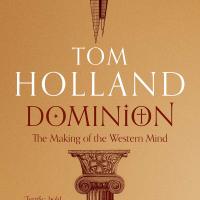In his latest book, Dominion, Tom Holland has set himself a difficult – some might even argue impossible – task: ‘to trace the currents of Christian influence that have spread most widely, and been most enduring into the present day.’ In doing so, he gives the genesis of Christianity in the ancient world, along with compelling arguments for its subversive and revolutionary nature, and how, over the course of the last two thousand years, it has continued to revolutionise the way we in the West behave. Holland aims to show just how essential our Christian history – and our often-hidden continuing Christian morality – is to every aspect of our lives, and to prove that we ‘live in a society still utterly saturated by Christian concepts and assumptions.’
In doing so, he gives the genesis of Christianity in the ancient world, along with compelling arguments for its subversive and revolutionary nature, and how, over the course of the last two thousand years, it has continued to revolutionise the way we in the West behave. Holland aims to show just how essential our Christian history – and our often-hidden continuing Christian morality – is to every aspect of our lives, and to prove that we ‘live in a society still utterly saturated by Christian concepts and assumptions.’
A book of this scope can’t hope to cover everything, so instead Holland focuses on those features that are particularly pertinent to his story: the ideas we still exhibit today, and their origins in our Christian past. These he weaves into a narrative that is original in thought and concept. Carefully selected evidence builds his argument well, and his rhetoric can be masterful. In talking about the famous Enlightenment thinker and critic of Christianity, Voltaire, for example, he uses the great philosopher’s words and ideas against him in a manner so thoroughly convincing that Cicero would be proud. Holland’s analysis of certain world-altering events – the rise of natural philosophy and its morphing into what we now know as science, the American and French revolutions, the development of Marxism and Communism – are all on point and show an impressive depth of understanding of the human (or should I say Western) psyche. All this is combined with his usual verve for great narrative history: the book is fast-paced, witty, engaging, and well-referenced. The tangents, as always, bring to life his subjects in unexpected ways – Otto the Great, we are told, was known for ‘the quite spectacular hairiness of his chest’, while Reverend William ‘Buckland’s most startling feat … was to gobble down what was reliably reported to have been the heart of King Louis XIV of France.’ And there are descriptions gruesome enough to make the reader squirm, including that of the Persian form of execution known as the scaphe.
And there are descriptions gruesome enough to make the reader squirm, including that of the Persian form of execution known as the scaphe. But there is also an awareness that Dominion should not just be a history of ‘great men’. ‘The Christian revolution was wrought above all at the knees of women’, so women as diverse as Elizabeth of Hungary and Elisabeth Salm, Isabella of Castile and the 1825 sati of Ambabai, among many others, all feature here.
But there is also an awareness that Dominion should not just be a history of ‘great men’. ‘The Christian revolution was wrought above all at the knees of women’, so women as diverse as Elizabeth of Hungary and Elisabeth Salm, Isabella of Castile and the 1825 sati of Ambabai, among many others, all feature here. It thus provides a balanced social and cultural approach to the history of Christianity beyond the usually dry tales of churches, monasteries, dogma, and popes.
It thus provides a balanced social and cultural approach to the history of Christianity beyond the usually dry tales of churches, monasteries, dogma, and popes.
Unsurprisingly for a book that not only focuses on Christianity but seeks to show what many believe to be its antitheses – secularism and atheism – as inevitable children of it, Dominion has something of a ‘Marmite effect’. Holland himself tweeted in September 2019 that ‘Christians - unsurprisingly, I guess – [are] much readier to accept the central thesis of Dominion than those who cleave to an alternative faith position’. There are those who question both Holland’s selection of evidence and his reading of humanity. And yes, I would have liked to have seen less heavy reliance on biblical sources for some of his early chapters, and it would help his argument to have more comparative examples from other areas of the world. I might also question whether there is an element of naivety in some assumptions: given the recent Hollywood and royal scandals, as well as the behaviour of certain politicians, it’s not entirely possible to state that Christianity has had ‘total success’ in eradicating the ‘sexual order rooted in the assumption that any man in a position of power had the right to exploit his inferiors’.
There are those who question both Holland’s selection of evidence and his reading of humanity. And yes, I would have liked to have seen less heavy reliance on biblical sources for some of his early chapters, and it would help his argument to have more comparative examples from other areas of the world. I might also question whether there is an element of naivety in some assumptions: given the recent Hollywood and royal scandals, as well as the behaviour of certain politicians, it’s not entirely possible to state that Christianity has had ‘total success’ in eradicating the ‘sexual order rooted in the assumption that any man in a position of power had the right to exploit his inferiors’. For many people it has, hence the popularity of the #MeToo march. But surely, that so many came forward as victims suggests that attitudes of the powerful haven’t changed much. Furthermore, and according to Amnesty International, some countries, despite being Christian, are less concerned with human rights than others.
For many people it has, hence the popularity of the #MeToo march. But surely, that so many came forward as victims suggests that attitudes of the powerful haven’t changed much. Furthermore, and according to Amnesty International, some countries, despite being Christian, are less concerned with human rights than others. The fact that there are considerable differences in the application of Christian morality across Christendom could suggest that it is not the only deciding factor in our behaviour.
The fact that there are considerable differences in the application of Christian morality across Christendom could suggest that it is not the only deciding factor in our behaviour.
Dominion, however, is not written in blind faith, and nor is it a wholesale endorsement of Christianity: Holland shows the bad along with the good, and is no less willing to see the similarities between the Islamic State and early modern fundamentalist Christians than he is to trace the development of human rights to scripture and the Church Fathers. Instead, it is as much a description of his personal journey and relationship with Christianity as it is the West’s. He mentions his godmother, Aunty Deb, and his love of dinosaurs; he takes us with him as he questions his faith and then analyses his assumptions and actions. It is heartfelt; it is genuine; it is honest. But more than that, it is challenging. It makes us ask difficult questions of ourselves, to think about our perceptions of the world around us, and to acknowledge – however much we do or don’t want to – the multitude of influences that shape our lives. Tom Holland’s Dominion is not, therefore, just a work of history; it is also a work of philosophy.


